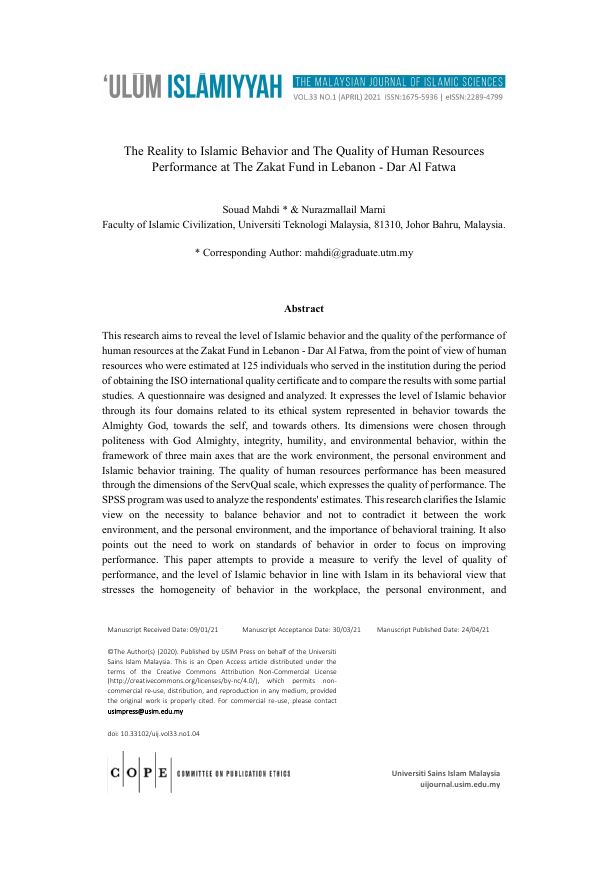The Reality to Islamic Behavior and The Quality of Human Resources Performance at The Zakat Fund in Lebanon - Dar Al Fatwa
DOI:
https://doi.org/10.33102/uij.vol33no1.261Keywords:
Islamic behavior, politeness with God, integrity, humility, environmental behavior, performance quality, Islamic behavior, politeness with God, integrity, humility, environmental behavior, performance qualityAbstract
This research aims to reveal the level of Islamic behavior and the quality of the performance of human resources at the Zakat Fund in Lebanon - Dar Al Fatwa, from the point of view of human resources who were estimated at 125 individuals who served in the institution during the period of obtaining the ISO international quality certificate and to compare the results with some partial studies. A questionnaire was designed and analyzed. It expresses the level of Islamic behavior through its four domains related to its ethical system represented in behavior towards the Almighty God, towards the self, and towards others. Its dimensions were chosen through politeness with God Almighty, integrity, humility, and environmental behavior, within the framework of three main axes that are the work environment, the personal environment and Islamic behavior training. The quality of human resources performance has been measured through the dimensions of the ServQual scale, which expresses the quality of performance. The SPSS program was used to analyze the respondents' estimates. This research clarifies the Islamic view on the necessity to balance behavior and not to contradict it between the work environment, and the personal environment, and the importance of behavioral training. It also points out the need to work on standards of behavior in order to focus on improving performance. This paper attempts to provide a measure to verify the level of quality of performance, and the level of Islamic behavior in line with Islam in its behavioral view that stresses the homogeneity of behavior in the workplace, the personal environment, and behavioral training. This measure will support the civilized view of Islam and its institutions and alleviate Islamophobia.
Downloads
References
Abu Daf, M. (2016). The Messenger's Approach to Evaluating Behavior and How to Benefit from It in Our Contemporary Education. Paper presented at developing programs for colleges of education in the Arab world in the light of local and international developments Conference, 8-9 February. Zagazig University, available at http://khalil-alhadri.com/uploads/library/8187813c6db4a691eeba1b12f016df3c.pdf
Chandrasekar, K. (2011). Workplace environment and its impact on organisational performance in public sector organisations. International journal of enterprise computing and business systems, 1(1), 1-19.
Chiu, C.-Y. C., Owens, B. P., and Tesluk, P. E. (2016). Initiating and utilizing shared leadership in teams: The role of leader humility, team proactive personality, and team performance capability. Journal of APPlied Psychology, 101 (12), 1705-1720.
De Leeuw, A., Valois, P., Ajzen, I., and Schmidt, P. (2015). Using the theory of planned behavior to identify key beliefs underlying pro-environmental behavior in high-school students: Implications for educational interventions. Journal of environmental psychology, 42, 128-138. https://doi.org/10.1016/J.Jenvp.2015.03.005
Al-Ghamdi, S. (2010). Business ethics is a development imperative and legitimate interest (Volume 242(. Muslim World League Series Calling to Truth: Mecca.
Al-Hayali, W. N., and Odeh, M. (2016). The role and effects of training in increasing labor force productivity. Academic Book Center: Amman.
Jayaweera, T. (2015). Impact of work environmental factors on job performance, mediating role of work motivation: A study of hotel sector in England, International journal of business and management, 10 (3), 271-278. https://doi.org/10.5539/ijbm.v10n3p271
Johnson, M. K., Rowatt, W. C., and Petrini, L. (2011). A new trait on the market: Honesty-Humility as a unique predictor of job performance ratings. Personality and individual differences, 50 (6), 857-862. https://doi.org/10.1016/j.paid.2011.01.011
Leroy, H., Palanski, M. E., and Simons, T. (2012). Authentic leadership and behavioral integrity as drivers of follower commitment and performance. Journal of Business Ethics, 107 (3), 255-264. https://doi.org/10.1007/s10551-011-1036-1
Al-Kattani, M. (1989). from an Islamic Perspective. Dar al-Thaqafa for Publishing and Distribution: Casablanca.
Mutab, H. K. (2015). Servant leadership and its effect on team effectiveness. An analytical study of the opinions of a sample of members of local councils in the Qadisiyah Governorate. Al-Kout Journal of Economic and Administrative Sciences, 1 (17), 573-613.
Al-Moamar, W. S. (2014). The Relationship of Total Quality Management with the Performance of Employees in Palestinian Universities - Gaza Strip (Master Thesis, Al-Azhar University). http://search.shamaa.org/FullRecord?ID=118638.
Mohammad, A. Q., and Al-Khuzaie, A. (2014). Moral integrity among university students. Researcher Journal, 11, 7-22.
Mohammad, M. (2015). Modern organizational behavior. Dar Al-Moataz: Amman.
Ou, A. Y., Waldman, D. A., and Peterson, S. J. (2018). Do humble CEOs matter? An examination of CEO humility and firm outcomes. Journal of Management, 44 (3), 1147-1173. https://doi.org/10.1177/0149206315604187
Owens, B. p., Johson, M. D., and Mitchell, T. R. (2013). Expressed humility in organizations: Implications for performance, teams, and leadership. Organization Science, 24 (5), 1517-1538. http://dx.doi.org/10.1287/orsc.1120.0795
Palanski, M. E., Kahai, S. S., and Yammarino, F. J. (2011). Team virtues and performance: An examination of transparency, behavioral integrity. and trust, Journal of Business Ethics, 99 (2), 201-216. https://doi.org/10.1007/s10551-010-0650-7
Parasuraman, A., Zeithaml, V. A., and Berry, L. L. (1988). A Multiple Item Scale for Measuring Consumer Perceptions of Service Quality, Journal of Retailing, 64 (1), 12-40.
Pimentel, J.L. (2010). A note on the usage of Likert Scaling for research data analysis. USM R&D journal, 18 (2), 109-112.
Qutb, M. (1989). The Man between materialism and Islam. Dar Al Shorouk: Cairo.
Al-Satouhi, M. A. (2017). The Relationship between Servant Leadership and Talent Management: An Empirical Study. The Scientific Journal of Business and Environmental Studies, 8 (4), 877-834.

Downloads
Published
How to Cite
Issue
Section
License
Copyright (c) 2021 Souad Mahdi, Nurazmallail Marni

This work is licensed under a Creative Commons Attribution-NonCommercial 4.0 International License.
If the article is accepted for publication, the copyright of this article will be vested to author(s) and granted the journal right of first publication with the work simultaneously licensed under the Creative Commons Attribution-NonCommercial 4.0 International License, unless otherwise stated. Anyone may reproduce, distribute, translate and create derivative works of this article (for both commercial and non-commercial purposes), subject to full attribution to the original publication and authors. The full terms of this licence may be seen at https://creativecommons.org/licenses/by-nc/4.0/.







